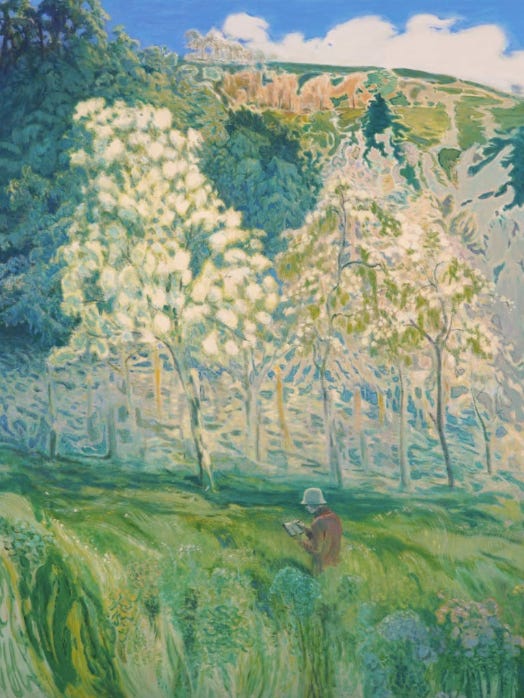"Excavating Interiorities": An Interview with Nix
On the love of language, and decisions as two-way doors.
How would you describe yourself in three words?
Perceptive, joyful, striving.
What made you first start your Substack, Starting from Nix?
I’m really interested in excavating interiorities, in the shape of others’ interiority and how we conduct self authorship. I started the blog as a documentation process of conversations with friends - that original aim has remained somewhat similar! I also really like this idea that the internet rewards energy signature and the quality of your ideas more than any other descriptor or proxy. I like that every good blogpost finds its readership by process of organic dispersion.
How did you start working in venture capital?
I heard venture described once as a force that redistributes economic potential into cultural outlets, and I love that sentiment. I know it feels far from the day to day work, but I really like this idea that there are sociocultural impacts of venture, and my favorite founders are sort of poet-philosopher types. I had initially thought I was going to do something in health/consumer health, and ran into my firm that invests in health!
You write how you're a lover of dualities. What's a duality you've been thinking about lately?
How you can care a lot about language and precision, and yet it's often the moments where you need them most that words can fail you.

How long have you been in San Francisco?
Four years, and I grow to love it more each year! I love the blustery cliffs, the fog, most of all the proximity to a certain flavor of ambition and how that lastingly ruptures your sense of what is possible. I like that there’s propulsion toward future, and that mostly it’s a utopian ideal. There are shortcomings as with all places, but I value its risk tolerance and agentic bent. It’s sort of enchanting.
What topics do you enjoy writing about the most?
I really like this idea of the inter-human by Martin Buber, and I reference it a lot indirectly in my writing: this idea of that there are emergent properties created uniquely between two people. What is beautiful is that even one person can lastingly alter your cognition or become embedded in your mental bloodstream in some way. I also really like writing about art, literature. I treat my writing as a living archive of my experiences, so I can be silly and have some fun with it too.

How have you gotten better at trusting your intuition?
My word of the year is attunement, so that probably means I’m not fully there yet but I believe there’s a wisdom that is not cerebral but is fully bodily. That sort of intelligence is often dismissed as blurry or ‘non-factual’. Long story short, listening more to the body!
You mention this quote by Terence McKenna that I really love:
"Nature loves courage. You make the commitment and nature will respond to that commitment by removing impossible obstacles. Dream the impossible dream and the world will not grind you under, it will lift you up."
What is a time recently you felt you hurled yourself into the abyss of a dream and it was rewarding in the end?
Moving to America. If you meet any international/immigrant the sentiment holds true that environment can very much shape you into a different self.
You also write about making choices and how, as Miyazaki puts it, a certain choice can mean losing the possibility of other potential selves. How have you gotten better at embracing your choices over time?

There are decisions that are one-way doors — as in, there’s an infinite finality to things. Most decisions are two-way doors. Not that you can go back to the original circumstance, but I believe you have more chances than one to divert or redirect the path. As long as your ego doesn’t get in the way. Maybe the helpful thing too is I believe in a sort of willful fatedness: you have will and can enact it upon a surface area, but the resulting momentum is all luck and fate.
What is the biggest thing you've learned this past month?
Giving yourself permission to take things seriously is very freeing. Also, that no love is ever wasted.

What’s a project you’re currently excited about?
Work! I am really engaged in my professional life and I think there’s a way to do a more open-ended exploration on socio-cultural impacts of LLMs and technology alongside an investing career. Everyone is now equipped to be an anthropologist slash historian of technology. One idea I’m thinking about today is Joel Sapolsky’s 2002 blogpost on leaky abstractions, or the idea that technology attempts to shield a user from complexity (and can fail).
What have been some Tiny Joys lately?
Going to local bookstore events. Tonight I went to the Autotheories launch by MIT press, described by one contributor as “a metabolizing, testing, and interrogation of theory through a lens of personal experience.” Vilashini Cooppan, one of the editors, reminded me of this story in Maggie Nelson’s Argonauts:
In Greek mythology, the Argo was the ship that Jason and the Argonauts sailed on their quest for the Golden Fleece. Over time, the ship's planks were replaced and over again. Eventually every component was fully replaced. Is the ship then the same ship? Nelson writes in The Argonauts: “Just as the Argo’s parts must be replaced over time but the boat is still called the Argo, whenever the lover utters the phrase ‘I love you,’ its meaning must be renewed by each use,” and she cites Barthes: “the very task of love and of language is to give to one and the same phrase inflections which will be forever new”.






Thank you Julia for interviewing me and sharing!!!